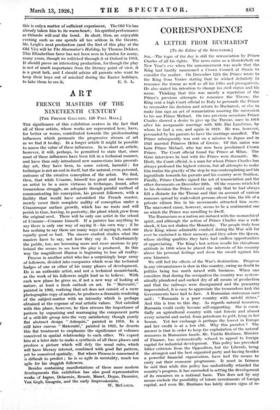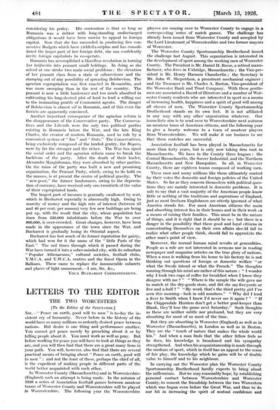CORRESPONDENCE
A LETTER FROM BUCHAREST
[To the Editor of the SPECTATOR.] SUL,—The topic of the day is still the renunciation by Prince Charles of all his rights. The news came as a thunderbolt on New Year's eve when the announcement was made that the King had hastily summoned a Crown Council at Sinaia to consider the matter. On December 12th the Prince wrote to the King from Venice stating that he wished definitely fo renounce the throne as well as all his titles and prerogatives. He also stated his intention to change his civil status and his name. Thinking that this was merely a repetition of the Prince's previous attempts to renounce the Throne, the King sent a high Court official to Italy to persuade the Prince to reconsider his decision and return to Bucharest, or else to make him sign an act of renunciation assuring the succession to his son Prince Michael. On two previous occasions Prince Charles showed a desire to give up the Throne, once in 1918 after his morganatic marriage with Mlle Zizi Lambrino, by whom he had a son, and again in 1919. He was, however, persuaded by his parents to have the marriage annulled. The Prince subsequently was sent on a mission to Japan and in 1921 married Princess Helen of Greece. Of this union was born Prince Michael, who has now been proclaimed Crown Prince. The Court official found the Prince at Milan. The three interviews he had with the Prince were dramatic. Mr. Hiott, the Court official, is a man for whom Prince Charles has always professed the highest esteem, but all attempts to make him realize the gravity of the step he was contemplating and his ingratitude towards his parents and his country were fruitless. Finally, Prince Charles signed the act of renunciation and the other documents on December 28th. Of the reasons which led to his decision the Prince would say only that he had always felt a distaste for the Throne and that on account of various rumours spread by malevolent persons about him, the life of a private citizen free in his movements attracted him more. The unavowed cause, however, seems to be a sentimental one on which the Prince was unwilling to dwell.
The Rumanians as a nation are imbued with the monarchical spirit, and although the action of Prince Charles was a rude shock, it has not shaken the Monarchy. The people truly love their King, whose admirable conduct during the War will for ever be enshrined in their memory, and they adore the Queen, whose sterling qualities they have had endless opportunities of appreciating. The King's last action recalls his chivalrous attitude in 1916 when he placed the interests of his country above his personal feelings and drew the sword against his own kinsmen.
We still feel the effects of the War's destruction. Progress in any circumstances is slow in this country, owing no doubt to politics being too much mixed with business. When one considers that during the occupation the country was system- atically plundered and sucked dry of all means of production and that the railways were disorganized and the peasantry impoverished, it is easy to appreciate the tremendous task the Governments have had to face. A Rumanian statesman once said : " Rumania is a poor country with untold riches." And this is true to this day. As regards natural resources, Rumania could easily become self-supporting. She is essen- tially an agricultural country with vast forests and almost every mineral and metal, from petroleum to gold, lying in her bosom. Yet her exchange is perhaps the lowest in Europe and her credit is at a low ebb. Why this paradox ? The answer is that in order to keep the exploitation of the natural resources in Rumanian hands, Mr. Vintila Bratianu, Minister of Finance, has systematically refused to appeal to foreign capital for industrial development. This policy has provoked bitter criticism from the Opposition, but the Liberals, being the strongest and the best organized party and having besides a powerful financial organization, have had the means to carry out their economic programme. It must in fairness be said that while this policy has undoubtedly retarded the country's progress, it has succeeded in setting the development of its resources on a national basis. This does not by any means exclude the possibility of future investments of foreign capital, and even Mr. Bratianu has lately shown signs of re-
considering his policy. His contention -is that so long as Rumania was a debtor with long-standing undischarged obligations it would have been unwise to appeal to foreign capital. Now -that she has succeeded in producing five con- secutive Budgets which have yielded a surplus and has-consoli- dated the larger part of her foreign debt, she can confidently invite foreign capitalists to co-operate. - Rumania has accomplished a bloodless revolution in turning her latifundia into peasant small holdings. In doing so she solved at one stroke two main social problems : the elevation of her peasant class from a state of subservience and the stamping out of any possibility of spreading Bolshevism. The agrarian expropriation was first enacted in Bessarabia, and was more sweeping than in the rest of the country. The peasant is now a little landowner and too much absorbed in cultivating his long-desired plot of land to lend a willing ear to the insinuating prattle of Communist agents. The danger of Bolshevism is almost nil in Rumania, and of this even the Soviets are apparently convinced.
Another important consequence of the agrarian reform is
the disappearance of the Conservative party. The Conserva- tives and the Liberals were the only two political parties existing in Rumania before the War, and the late King Charles, the creator of modern Rumania, used to rule by a convenient system of " Ins " and " Outs." The Conservatives, being exclusively composed of the landed gentry, the Boyars, were by far the stronger and the richer. The War has upset the social order and the- agrarian reform came to break the backbone of the party. After the death of their leader, Alexandre Marghiloman, they were absorbed by other parties. On the ruins of the party was built a new and promising organization, the Peasant Party, which, owing to its hold on
the masses, is at present the centre of political gravity. The " new-poor," the former landowners; owing to the deprecia- tion of currency, have received only one-twentieth of the value of their expropriated lands.
The largest part of incomes is generally swallowed by rent, which in Bucharest especially is abnormally high. Owing to scarcity of money and the high rate of interest (between 25 and 40 per cent. per annum) very few new buildings are being put up, with the result that the city, whose population has risen from 350,000 inhabitants before the War to over 800,000, is over-crowded. Great changes, however, have been made in the appearance of the town since the War, and Bucharest is gradually losing its Oriental aspect.
Bucharest has lost much of its former reputation for gaiety, which had won for it the name of the " little Paris of the East." The sad times through which it passed during the War have turned it into a sober-minded city, with its suburban " Popular Athenaeums," cultural societies, football clubs, Y.M.C.A. and Y.W.C.A. centres and the finest Opera in the Balkans. These came to replace the innumerable cabarets and places of light amusement.—I am, Sir, &c., YOUR BUCHAREST CORRESPONDENT.































































 Previous page
Previous page